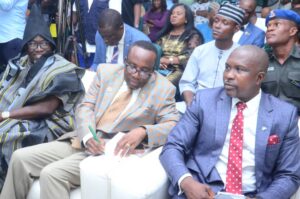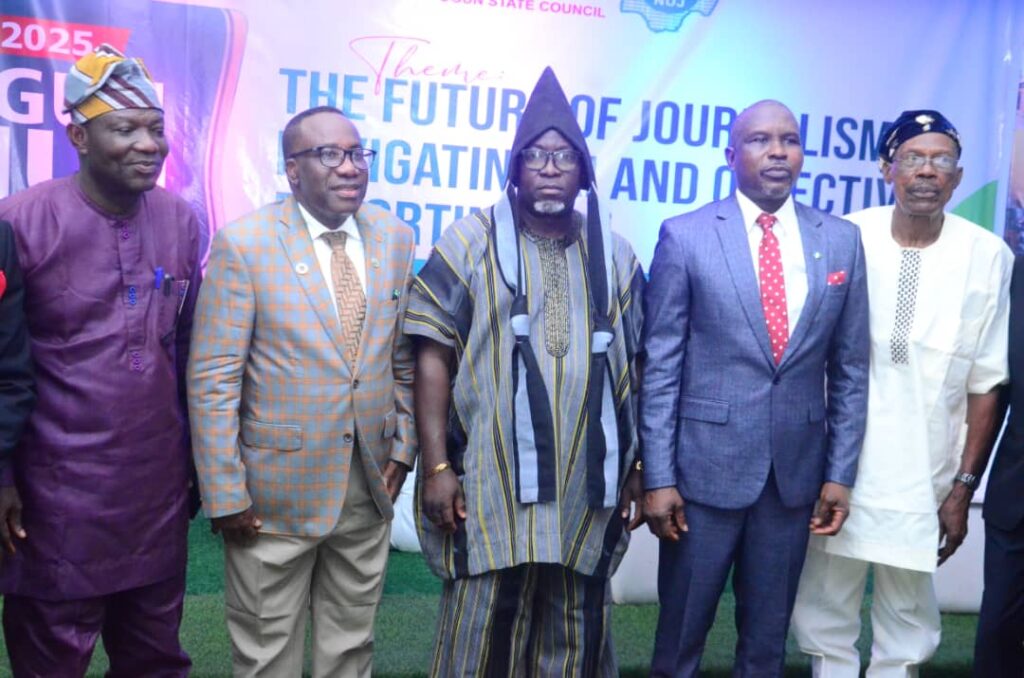Daud Olatunji
Nigeria is on the cusp of a major digital transformation as the Federal Government prepares to deploy 90,000 kilometres of fibre optic broadband across the country, according to Senator Shuaib Afolabi Salis, Chairman of the Senate Committee on ICT and Cyber Security.
Speaking after his presentation at the Ogun 2025 NUJ Press Week held in Abeokuta on the theme “The Future of Journalism: Navigating AI and Objective Reporting”, Senator Salis described the initiative as the next phase of Nigeria’s communication revolution.

“This government under President Bola Tinubu is going to deploy 90,000 kilometres of fibre optic broadband across the country. Not just in some states, not just in some local governments; there is no ward that will not have fibre optic presence,” he declared.
Drawing a parallel with the 1999 liberalisation of Nigeria’s telecoms industry, Salis recalled that many had doubted the sector’s potential.
“At the time, people asked who would make phone calls in Nigeria. But today, 25 years later, MTN has commissioned the biggest data centre in Africa. The same way we had that revolution, another is about to happen in our digital space,” he said.
He noted that research shows that “a 10 percent increase in fibre penetration leads to a minimum of two percent GDP growth. Just imagine if we deploy fibre optic in every ward across Nigeria.”
Salis revealed that Nigeria’s pitch at the recent UN General Assembly had attracted interest from global investors.
“We don’t want this to be just government infrastructure; we also want private sector involvement for corporate governance and sustainability,” he said.
...Nigeria Among Top 10 Nations with AI Strategy
Beyond broadband deployment, Salis highlighted Nigeria’s global recognition in artificial intelligence.
“Nigeria is ranked among the first 10 countries in the world with an AI Strategy. What makes ours unique is that it was built collectively.
“We created a portal and invited Nigerians who are AI experts from across the world to contribute. The result is one of the most robust AI strategies in Africa,” he explained.
He added that the strategy, known as the AI Collective, reflects Nigeria’s readiness to embrace the future.
“This is not just about technology adoption but about positioning Nigeria as a leader in digital innovation,” Salis stressed.
… National Assembly Pushes Digital Economy and E-Govt Bill
On the legislative front, the senator disclosed that the National Assembly is set to pass the National Digital Economy and E-Government Bill, which will modernise Nigeria’s legal framework for digital transactions.
“In 1998/1999, the digital economy contributed less than one percent to our GDP. Today it is close to 20 percent. But that is not the full potential.
“The Bill will replace analogue laws that hinder electronic transactions. If you want a signature, it must either be physical or digital. If you want a document, it must be physical or electronic. That’s the essence of this Bill,” he said.
Turning to the Press Week theme, Salis warned that while AI presents opportunities, it also threatens professional journalism.
“The challenge for journalists is that AI can increase quackery in the profession. That’s why technology must be embedded in mass communication curricula, not as an afterthought. Practising journalists must also undergo continuous capacity building,” he advised.
He pledged to partner with the NUJ Ogun Council on AI-driven training and capacity development.
Salis further urged journalists to embrace self-regulation, warning that the repeal and re-enactment of Nigeria’s Cybercrime Law would continue to seek a balance between “freedom of expression and national security.”
He emphasised the need for professional differentiation in an age where AI-generated content risks making outputs uniform. “AI is an enabler, not a replacer.
In the past, you could identify Olatunji Dare’s satire, Dele Giwa’s Parallax Snaps, or Stanley Macebuh’s opinions. That professional identity is disappearing. Journalists must reclaim it,” he insisted.
The senator also called for greater collaboration within the Nigerian media industry.
“It’s better to have five percent of 100 than 100 percent of zero. Too many small publications could come together and build stronger platforms to attract advertisers and earn respect. Instead, it is clout chasers, not professional journalists, who are benefitting more from digital technology,” Salis said.
He said “facts are sacred, opinions are free. Objectivity remains at the kernel of any credible media organisation,” he affirmed.
Do you want to share a story with us? Do you want to advertise with us? Do you need publicity for a product, service, or event? Contact us on WhatsApp +2348183319097 Email: platformtimes@gmail.com
We are committed to impactful investigative journalism for human interest and social justice. Your donation will help us tell more stories. Kindly donate any amount HERE




